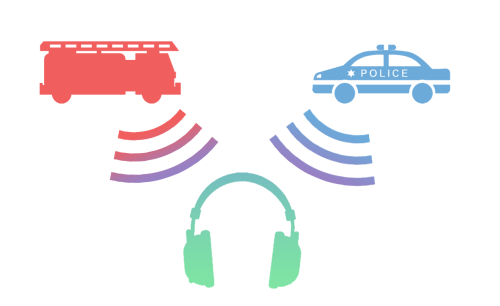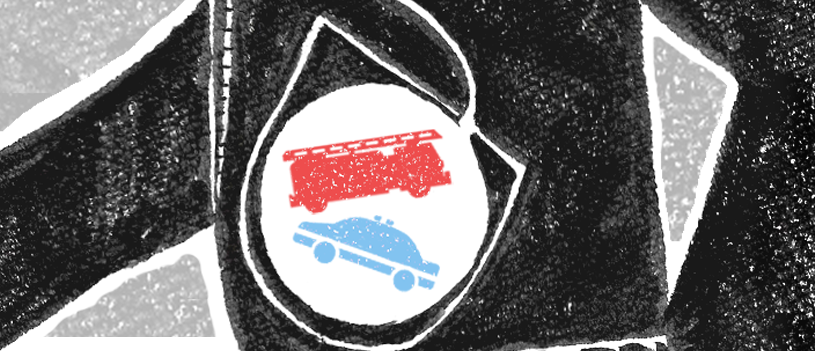I first started with scanners when I became the president of the block club in my community in 2008. I always wanted to know what was going on in the neighborhood, you know, you see flashing lights, you don’t know what’s going on. So, I found an app on my phone. If there was fire or police activity I was able to turn on the scanner, see what’s going on, just to make sure the neighborhood was safe. A lot of the, you know, riff-raff—whatever you want to call it—travel in my neighborhood to get to where they want to go. Sometimes they bring some of their habits with them. So that’s how I originally got into it.
I have an app on my phone, it’s called Radio Scanner Pro. And with that app I can listen to anywhere in the world. From LA to New York to even some places in Canada. Radioman—I listen to that on my computer exclusively. Or I’ll check the incident board—see what’s going on in the city. If you go to the site, on the right hand side you will see all major incidents from Chicago and the suburbs. I’m gonna read you off just a couple of things that have transpired in the last, let’s just say, six, seven hours. We got a working fire over at 73rd. In Chicago, at 11:02am, you have two people shot at South Champlain. So I would go to this and I would click on the incident and I will see what the details were of the incidents. And if I go to my ABC app or my NBC app, they have not yet reported this incident. But I’m pretty sure they will by the time the news come on tonight.

Marcello Siggers, thirty-five, who now lives in South Deering, is an Englewood-born songwriter and producer. He is also a photographer in his spare time. In 2010, a college friend and then recent graduate of the Chicago Fire Academy invited Siggers to photograph “the guys” of Chicago Fire Department Engine Company 72, Fire Ladder 34, Battalion 23 on South Chicago Avenue. In October of the same year, a member of the Battalion died while responding to a fire. Siggers decided to create a book in remembrance of the fallen firefighter, Corey Ankum. The book, entitled Tour of the 23rd Battalion, was two years in the making and established an enduring bond between Siggers and the firemen. At Engine Company 72 on a recent morning, Siggers and I strolled the perimeter of the fire station as he explained the intricacies of the engine, tower ladder, and ambulance, pointed out the memorials around the house, and introduced me to each fireman by name. Though not a fireman himself, Siggers has cultivated a deep personal connection with the members of the Chicago Fire Department and a significant understanding of the work they do every day.
That’s how I was introduced to Dave Weaver [who runs the website Radioman911.com, a Chicagoland Fire Radio Feed.] I was posting pictures from some incidents I went to [while documenting for the book] and he hit me up on Facebook, like, “Hey, you know, these pictures are cool.” And I said, “You’re Dave, you know, I’ve heard about you.” So we exchanged numbers and I found out that he had a community of thousands of people.
There were guys that were able to log into Radioman that were actual firemen, hear what was going on and start making their calls. So the idea that Dave put together was actually an exceptional idea because it gives people the opportunity to know exactly what is going on. And it’s not a thing where people are doing this for fun. I think people are doing it because they genuinely care about our first responders. Because some of the people, actually a majority of people, they would show up at funerals. You got some of the guys that are involved with Radioman911.com, they will actually go to the scene, sometimes they will type on the message board, “Hey, I’m at the scene. This is what is going on…” And from there, a person will be able to input that information on each individual incident.
I think that people generally have a care for the fire department. Some people just have different careers, they chose different paths in life, and some of the guys, they are volunteer firemen. I mean, you find a wide range of guys. Some of them retired, some of them are volunteers, they work for other cities. Everybody wants to be a hero at one point, right? Some of us don’t get the opportunity to be a hero. Some of us care about our first responders. Sometimes listening to those scanners and knowing what’s going on and being able to get the information as it comes in is kind of almost like a duty at a certain point.
Do you think that people listen to police scanners for a similar reason?
Well, the police scanner thing is not as big as the fire scanner thing. I will admit that, in general. Unless you have, like, a significant incident going on—then people may tune in.
I feel that we do need to encourage people to listen to the Chicago radio scanners. Reason being—and this is from my own personal experience—sometimes, especially those summer nights, when you listen to those Chicago police scanners, it’s nightmarish. Because you’re hearing that police officer huff and puff through that microphone as he’s chasing that suspect. I’ve listened to police scanners where there’s actually been shots fired. It was an incident where [the officer] got shot in the neck. I was actually listening to the police scanner that night. He got shot in the neck. So, they panicked—I’m pretty sure you could search this, “Officer gets shot in the neck, rushed to the hospital,” and you could actually find this online. And you’re hearing the partner. He’s using profanity, he’s screaming at the top of his lungs, and they’re zooming to that hospital. You get to hear the things that go on at the scene. The things that separate us from most people, when it comes to police, is that we actually know. We have an understanding. Because all police aren’t bad. If you put yourself in their shoes, everyone will have a different idea. All of us are sinners, we are all imperfect beings, right? You cannot expect a flawed creature, which we all are, to do a job with other flawed human beings [without] some types of casualties. Because this is almost an impossible job. The people are not educated, and it’s not their fault, it’s the city’s fault. Then the city wants to hide the truth. And from them hiding the truth, the morale of the officer is on a steady decline.
What do you mean when you say that the city wants to hide the truth? What truth?
The truth that this is a chaotic place. Chaos happens every night, there’s things that go bump in the night. There’s chaos within the community. There’s violence. And my personal educated guess is that, well you know, we’re not any better than any other city. I’m gonna tell you here, what I’ve seen with my own eyes, what I’ve heard on these scanners, there are a lot of things that go on in the city that are very, very bad. When people turn on the news all they see is police running around with the yellow tape. “Oh, a child was shot. Such and such was the block. Right now police are on the scene collecting evidence.” Those things are chaotic, they are loud, they’re noisy and they’re terrible. Okay? Most people would never know what it’s like for an officer to pull up on the scene and have a child shot. I’ve heard those calls before.
There is this outcry that police aren’t doing what they’re supposed to do. The truth of the matter is, our police officers are in a very highly dangerous profession. This is not the movies. You could go find this on YouTube; there are people out there that have said it, that they will kill a police officer. Here in Chicago. It almost reminds me of when, years ago, when they said fire departments, all they do is sit in the fire house and watch TV and lift weights. That’s all they do. And that’s not the case. And some of the stuff that you see, believe me, you’re gonna wanna go watch TV too after you see that. I mean this is crazy. And as for Radioman, this is a community. We know and that’s why we support our police and firemen. It’s almost like we’re with them when we’re listening.
I’m still the president of my block club. And these people are in their seventies and eighties. One thing I know about them is—I guess being old people in Chicago—they have a little better understanding, because they knew how it was when they was growing up. You respected the police. If they came and told you to get off that corner and go to school, you went to school. These kids don’t have that same respect. The gangs are reckless right now. There’s a lot of fractions going on. And I am a former member of the gangs, I will admit to that. You had to keep a certain GPA. You didn’t cuss in front of elders. You kept your block clean. You wanna know why we did all that? Because it kept the heat from the police, from the neighborhood. Right now these kids are just running reckless and they’re shooting people, and shooting people for no good reason at all. No reason.
You said you worked on your book Tour of the 23rd Battalion between 2011 and 2013 and that was often the motivation to go to the scenes and listen to the scanner. What is the reason you continue to do so today?
I like to say that I adopted thirty firemen. And the house as well. I got about ten I’m real close to. I became so close to these guys I get invited to their family events. I became a part of the brotherhood of the fire department. And I have a lot of friends that are police. But also sometimes I just want to keep myself in the know about what they’re doing. I want to understand. So, like I said, just to know what’s going on in my community. Because I don’t listen to the city-wide scanner, I listen to the zone I live in, which is Zone 8. I just want to know what’s going on in the neighborhood and stuff. So I can be up to date.
A lot of people don’t understand, because they’re not trying to understand a role of a police officer. You imagine coming to someone’s house at 2:30 in the morning—everybody’s upset, everyone’s got weapons, they’ve got bats, they’ve got skillets, whatever—and they’re mad at you because you have the nerve to show up. Even though somebody called you. But now you’re the enemy. So imagine someone doing that every night for twenty years and you ask yourself: how would you be feeling after twenty years of dealing with that? It’s rough. So, I would love for more people to listen to the scanners so they can have an idea of what’s going on. But for the most part there’s not a big community of radio scanner listeners here on the South Side. I wish there was though.

